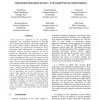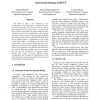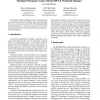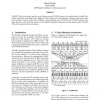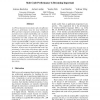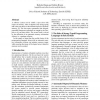114
click to vote
WIESS
2000
15 years 3 months ago
2000
Our research is motivated by the scaleability, availability, and extensibility challenges in deploying open systems based, enterprise operational applications. We present Delta�...
110
click to vote
WIESS
2000
15 years 3 months ago
2000
The linker is often a time bottleneck in the development of large applications. Traditional linkers process all input files, even if only one or two objects have changed since the...
WIESS
2000
15 years 3 months ago
2000
86
Voted
WIESS
2000
15 years 3 months ago
2000
The HP V-Class server family provides up to 32 processors and 32 GB of memory in a single cabinet. Scalable Computing Architecture technology allows multiple V-Class cabinets to b...
110
click to vote
WIESS
2000
15 years 3 months ago
2000
This paper describes the crucial design and implementation issues that arise in building a fully automatic precompiled header mechanism for compiling industrial-strength C and C++...
158
click to vote
WIESS
2000
15 years 3 months ago
2000
HP Caliper is an architecture for software developer tools that deal with executable (binary) programs. It provides a common framework that allows building of a wide variety of to...
100
click to vote
WIESS
2000
15 years 3 months ago
2000
As IPC mechanisms become faster, stub-code efficiency becomes a performance issue for local client/server RPCs and inter-component communication. Inefficient and unnecessary compl...
WIESS
2000
15 years 3 months ago
2000
122
click to vote
WIESS
2000
15 years 3 months ago
2000
A software system can be called a safe-system with respect to memory, when it supports only strong-typing and it does not allow for the manual disposal of dynamic memory [2]. The ...
